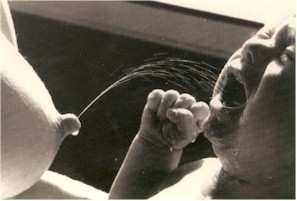Ask Anne…
 Question: I have a one month old baby who only wants to nurse on one breast – is that normal? Also, about once a day, she spits up after she nurses. Please let me know what to do.
Question: I have a one month old baby who only wants to nurse on one breast – is that normal? Also, about once a day, she spits up after she nurses. Please let me know what to do.
Answer: Is this something that just started recently, or has she had a preference for the right side from the beginning?
If you have had mastitis recently, that can change the taste of the milk and make it saltier, and that can make babies suddenly reject that breast. If your baby has an ear infection, that can make it more comfortable for her to nurse on one side or the other. If the breast refusal developed suddenly and continues, then you might want to have your doctor check it out, because (RARELY), babies will suddenly refuse to nurse from a breast that develops a tumor.
It is very normal for one breast to produce more milk than the other, and for a baby to only want to nurse on one breast.
The two breasts are not identical. The nipples may be different shapes or sizes – for example, one may be flatter than the other, and more difficult for the baby to latch on to. Most mothers notice that one breast produces more than the other (ask anyone who uses a double pump). In some mothers, the difference is subtle; in other mothers, one side produces only drops while the other side is overflowing. Most moms fall somewhere in between, with one side a little different from the other.
The only real reason for having two breasts is in case you have twins. It is entirely possible to nurse a baby using only one breast, if you have to. Many babies develop a favorite side, and only wants to nurse on one breast. Sometimes it’s the side that produces the most, sometimes it’s the side that produces less, because the milk doesn’t gush out as quickly and forces them to gulp and choke. Some babies show a preference for one breast temporarily, and then start taking it again just fine. Others will continue to have a strong preference for as long as the mom breastfeeds, and some refuse to take one breast completely.
You can try offering the right breast first, and then the second. You can also try pumping the left side if the baby gets frustrated and doesn’t stay on long enough to give you good stimulation. She may want to nurse more often on the right side, but your supply should increase to meet the demand.
It’s important to keep track of her urine and stool output, and to check her weight. If she is gaining weight well, then it doesn’t really matter if she nurses from one breast or both. If she isn’t gaining well, then you may need to nurse more frequently, pump and supplement with your milk, or supplement with bottles of formula. Usually, frequent stimulation on the right breast will make it produce enough to feed your baby. Since she’s only a few weeks old, you’re still in the early stages of nursing. You may find that your supply increases on the left side as time goes on. If the problem is that one nipple is shaped differently or one breast gets fuller and more engorged than the other and is more difficult to latch on to, then time may resolve the problem. If she continues to refuse the left breast completely, then using a nipple shield on that side might be helpful. There is info about using shields with latch on problems in the article Flat and Inverted Nipples.
Spitting up in a baby who is gaining weight adequately rarely indicates a medical problem. All babies spit up occasionally, usually because they are taking in too much milk at a feeding.
The article Nursing Strike has info on how to get your baby to take the breast when he or she refuses to nurse or only wants to nurse on one breast. I wish you luck in getting her to take both breasts, but remember that she can get all the milk she needs on one side if she refuses to take the other side no matter what you do.
Anne Smith, IBCLC
Breastfeeding Basics
 Breastfeeding Basics
Breastfeeding Basics




